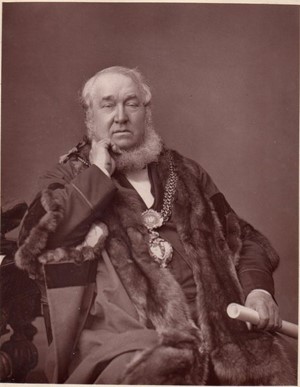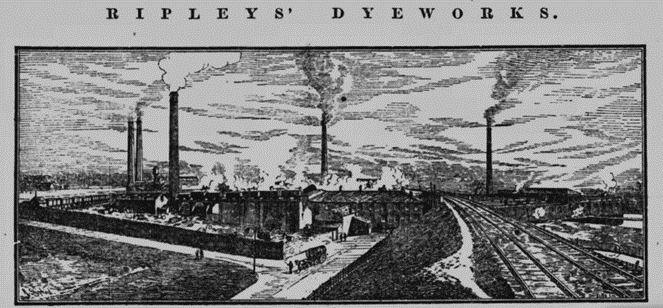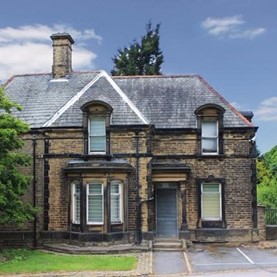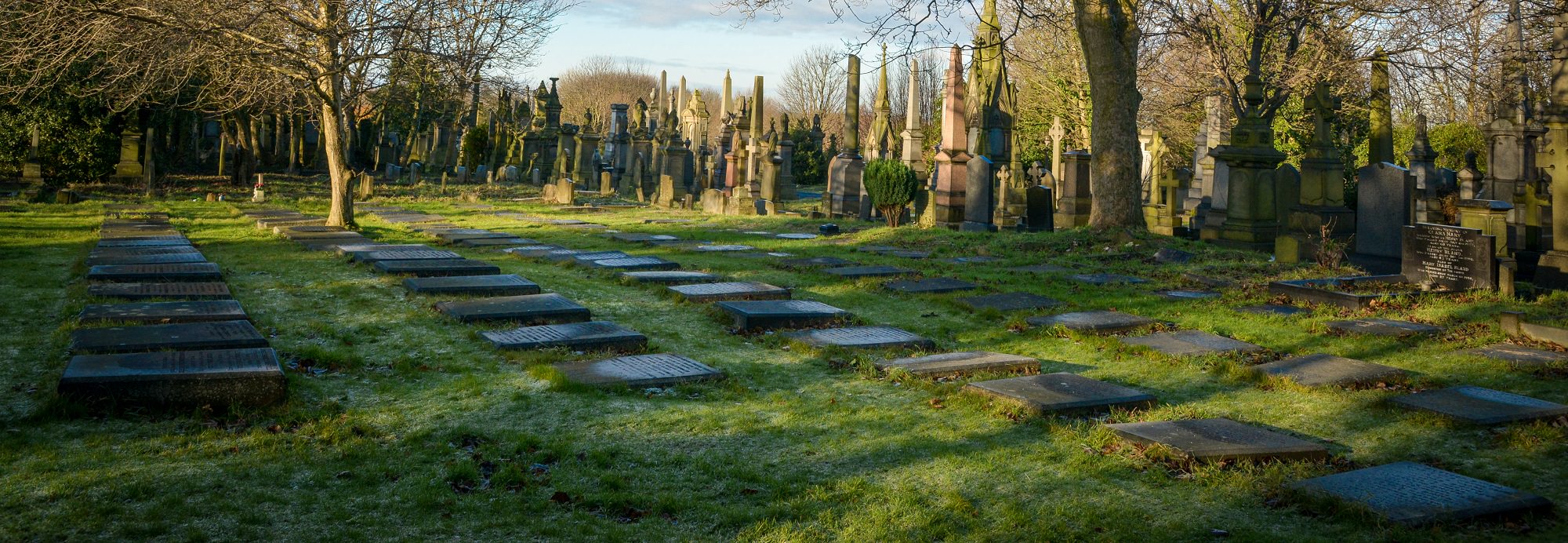Wilson Sutcliffe
Wilson Sutcliffe JP (1809 – 1889)
20th Mayor of Bradford 1875-76

Wilson Sutcliffe was born in 1810 in Shelf (near Northowram), Halifax. His father was Henry Sutcliffe, farmer of Shelf, then Assistant Overseer & Tax Collector for Bowling, Bradford. After Wilson’s education at school, he went into the dying trade at Washer Lane Dyeworks in Halifax. Then in 1832 and 50 years thereafter he went to Bowling Dyeworks, Bradford as Assistant Manager and later General Manager, there being only three dyeworks then as the trade was in its infancy. Subsequently he influenced the development of Ripley dyeworks resulting in enhancing the prosperity of the worsted trade. In 1853 he became a partner in the firm and was succeeded by his son Henry.

Ripley Dyeworks (aka Bowling Dyeworks) – Messrs E Ripley & Son – was probably the largest and most successful establishment in the late 1800’s connected with the dying trade in Great Britain. It began in a very small way in the early 1800’s by James Walton; George Ripley and his son Edward from Halifax joined him in a partnership known as George Ripley & Son in 1807. Wilson Sutcliffe became the manager of the firm in 1832 and subsequently a partner. Upon the death of George in 1834 it became E Ripley & Son. This developed to be a partnership between Henry Ripley and Wilson’s son Henry Sutcliffe. When the railways came to this area, the Leeds, Bradford & Halifax section of the Great Western Railway line cut the works in two, being an area of about 5 acres (not including the 3 reservoirs). As part of the initial dying process, sewing machines were propelled by steam power! During the development of the firm, two serious fires were encountered in 1853 & 1869 which allowed re-construction in non-inflammable materials. The firm consumes 2000 to 3000 tons p.a. of dye-wares and has its own sidings with trucks and a locomotive. The outcome is that 0.75M pieces p.a. are dyed and finished, requiring the efforts of 1000 hands, part of them residing in 200 houses owned by the company.
So, how did Wilson’s life develop and where did they live?
When Wilson Sutcliffe was 26 and a Dyer of Bowling, Bradford, he married on 15 June 1836 by License dated 11 June 1836 at St Peter (Bradford Cathedral) Mary Booth, age 23, of Bowling, born in Horton, Bradford in 1813.
In 1841 residing at Bowling Mill Lane, Bowling, was Wilson Sutcliffe, a Dyer, Mary his wife and his son Henry age 1 b. Jan-Mar 1840.
Wilson Sutcliffe of Bowling, a Dyer, age 33, was initiated into the Lodge of Hope, Bradford, as a Freemason of the United Grand Lodge of England on the 21 March 1843, passing on the 23 May and raising on 10 July, with Certificates on 8 March 1844. The records show he continued as a member to 1848 – and most likely beyond.
In 1851 at New Dyehouse, Bowling, were Wilson, a Manager of a Stuff Dyehouse, his wife Mary and children Henry, now a Scholar, Joseph, also a Scholar age 9 b. Apr-Jun 1842 in Bowling and Wilson (Jnr) age 2 born between Jan-Mar 1849 also in Bowling. They had a 19-year-old female House Servant.
In 1859 Wilson was living at the Old Dyehouse, Bowling.
Henry Sutcliffe married Mally (formally Martha but also called Matty) Barker Oct-Dec 1859 in Bradford.
In 1861 at Fawcett Holme, 4 Thornton Road, Bradford, were Henry, a Labourer, and his wife Matty 21 b. 1840 in Bradford; they were living at her family home, with farther John Barker, a Spinning Overlooker, mother Elizabeth and sister Susannah 1 b. 1860 in Bradford.
In the prime of his life, Wilson took a prominent part in the public affairs of Bradford. In 1862 he entered the Council as representative for Bowling Ward which he held for 12 years except for November 1874 to November 1875. In 1868 he was elected an Alderman which again he held for six years.
In 1871 at 1 Upper Barnett Fields, Bowling, were living Wilson, Stuff Dyer Worsted and an Alderman, Mary his wife, Joseph 28 and a Worsted Stuff Salesman, Wilson Jnr 22 and a Master Worsted Spinner, Martha Smith their daughter and a Widow age 32 b. 1839 in Bowling and an Annuitant, Mary Sutcliffe, daughter age 19 b. Apr-Jun 1852 in Bowling and also an Annuitant. They had two female General Domestic Servants.
Also, in 1871, at Bowling Dye Works, Bowling, were Henry, a Dyer, his wife Martha and daughters Kate age 3 born 10 June 1867, Mary Gertrude age 2 born 18 January 1869 and 4-month-old Florence Gray b. 19 November 1870, all in Bradford. They had two female servants: a General Domestic Servant and a Nursery Maid.
In 1875 Wilson Sutcliffe was elected as Mayor of Bradford and a JP. His first duty as Mayor was to open a portion of the Godwin Street markets. In 1880 he was again elected an Alderman and a member of most of the Council Committees; he was also vice-chairman of the Markets & Fairs Committee and sat on the Police Court. After two years he retired from municipal life. He was a strenuous Liberal and a Congregationalist at College Chapel.
In 1881 at 714 Manchester Road, Bowling, were Wilson, Magistrate, Alderman & Dyer (Stuff), Mary, a Dyer’s Wife, Joseph, a Stuff Merchant and Arthur, a Stuff Manufacturer, born Jul-Sep 1857 in Bradford. They had two female Domestic Servants.
Also, in 1881, at Bowling Lodge, Bowling, were Henry, a Worsted stuff dyer & finisher, his wife Martha and children: Kate, Mary, Florence, Agnes Jane b. 12 March 1873 and Annie born Jan-Mar 1875, all Scholars, plus Amelia b. Jul-Sep 1877, Henry b. 31 March 1879 and Samuel Gray, just one month old b. Jan-Mar 1881, all born in Bradford. They had four Servants: Cook, Nursemaid & two Housemaids.

Also in 1881, Wilson Sutcliffe Jnr. was a Lodger at 33 Manville Terrace, Horton, Bradford, with the MacDonald family. He was a Master Worsted Spinner, age 32.
In 1882 Wilson (Senior) resigned his office of Alderman.
Wilson Sutcliffe died on 30 April 1889 in Bradford, age 79 and buried in Undercliffe Cemetery. He had been an invalid for a few months; his condition changed for the worse and seen to be towards the end. He passed away quietly and was conscious to the last. The Town Hall bell was tolled in recognition of his death.
The Will (with a Codicil) of Wilson Sutcliffe late of Barnett Field, Bowling, Bradford, Dyer, who died on 30 April 1889 at Bowling was proved on 31 May 1889 at Wakefield by Henry Sutcliffe of Bowling, Dyer, and Arthur Sutcliffe of Eccleshill, Bradford, Stuff Manufacturer, the Sons and Executors. Personal Estate: £68,027 17s 4d. [Equivalent value now: £9.3M]
Re: The will of the late Mr. Wilson Sutcliffe: Probate of the Will dated 1 March 1880 with a Codicil made on 7 July 1888 was granted to the executors, his sons Henry and Arthur. He bequeathed to his wife Mary £100, the use and enjoyment of his house and furniture and an annuity for her life of £500. The residue of his estate he left in trust to all his children in equal shares, but to his son Wilson and his daughters to be paid the income of their shares for life. The value of the personalty estate was £68,027 17s 4d.
In 1891, at Eastmoor, Ben Rhydding Drive, Ilkley, Wharfedale, was Henry, a Dyer and finisher of stuff, Martha his wife and their children Kate, Mary, Florence, Henry & Samuel, both now Scholars, and another daughter Dorothy Gray 5 b. Oct-Dec 1885. There was also their niece Grace Maude Rhodes 24 b. 3 March1866, bap. 4 September at St Peter Church, Birstall, the daughter of William & Grace Rhodes. They had two Domestic Servants: A Cook and a Waiting maid [one who waits on another as a personal servant]. Their daughters Agnes, Annie and Amelia (Amy) were at school ‘Burlington House’ at Spring Grove, Heston, Brentford, Middlesex run by the School Mistress Medina Griffiths with 12 teachers to 48 Scholars plus 2 servants.
In 1901, still at Eastmoor, was Henry now 61 and an Employer, Magistrate and Chairman of the Dyers Association, Martha his wife and their children Kate, Mary, Florence, Agnes, Annie, Henry, a Worsted Stuff Dyer, Samuel, a Wool sorter, and Dorothy. They had 4 female Domestic Servants: A Cook and 3 Housemaids.
Henry Sutcliffe of Eastmoor, Ilkley, died on 26 May 1908 age 68. Probate in London on the 20th of August was granted to Martha Sutcliffe, his widow, and his son Henry Sutcliffe, Dyer’s Manager. Effects: £165,198 18s 8d. [Equivalent value now: Just under £21.5M]
In 1911, still at Eastmoor (which had 22 rooms with 13 occupants), was Martha, a widow, Kate, Mary, Florence, Agnes, all having Private Means, Henry, a Dyer’s Manager of cotton and wool dyers & finishers, and Samuel & Dorothy, both having Private Means. They had a Trained Nurse for sick nursing and 4 female Servants.
Martha Sutcliffe of Eastmoor, Ilkley, died on 8 July 1911 age 69. Probate in Wakefield on the 12 September was granted to her sons Henry Sutcliffe, Dyer, and Samuel Gray Sutcliffe, Gentleman. Effects: £7,346 19s 8d. Resworn: £7,458 10s 4d & £7,618 10s 4d.
In 1939, still at Eastmoor, were Kate, Mary, Florence, Agnes & Dorothy all of Private means with 3 female Domestic Servants.
Henry had married Kathleen A Wentworth in Apr-Jun 1917 at Sculcoates, Hull, Yorkshire. She was born on 21 January 1896. By 1939 Henry had retired and they were living at Dale View, Beechwood Grove, Ilkley with their son Jack, a student. He was born on 8 September 1920 in Bradford. They had a female Domestic Servant.
Editorial Note: The main players in this story are Wilson who was born at the start of the 19th Century, his wife Mary and Henry, Joseph, Arthur and Wilson Jnr, their sons. This research has taken Henry’s part of the story into the 20th Century showing the outcome of a good start in life which probably applies to his brothers too.
Research by David Broomfield – March 2022

